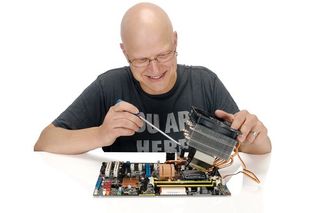
The hot weather has provided a theme for this week's PC gaming helpdesk. Cooling concerns have cropped up over and over again, so how much do you need to worry about what your CPU's temperature?
Every Tuesday, our hardware expert Adam Oxford is on hand to answer your hardware and software gripes. If you've got a question, ask below in the comments, or in the tech folder in our forum .
Enough Cooling?
My question regards the PC Gamer Rig. I'll be building it in about a month and was wondering about the cooling for the system. Should I invest in another couple of fans to put into the case? Similarly, should I consider a different heatsink to the stock Intel version or does that keep temperatures down all right by itself?
Elliot Metson
PCG : Putting together the Rig as it appears in the UK magazine will give you all the cooling you need, but you might want to upgrade the CPU and case fans (or even the case) to deal with noise. We've had no problems running even overclocked processors on stock cooling, but our ears have suffered a bit, if we're honest. For your CPU, Arctic Cooling's excellent Freezer 7 costs less than £18 and yet is barely audible and super-chilly, while the biggest improvement you can make to the Coolermaster Elite case we use is to fit a throttle to the existing fan, rather than replace it.
[MPU]
Seriously. How much is enough?
I do my PC gaming at a desk at home, with my PC tower inside a reasonably ventilated large drawer space. My current tower is 19 inches long, 8 inches wide and 16.5 inches deep and fits with just adequate air flow around it. The PSU needs to be at the top of the case too. When I look into building a PC of my own for the first time, what current mid size chassis/case would you recommend for my gaming PC & how many fans?
The biggest gaming news, reviews and hardware deals
Keep up to date with the most important stories and the best deals, as picked by the PC Gamer team.
H2o
PCG : Your current tower is a standard size for what's often called a 'midi' ATX case. It's identical, in fact, to the Coolermaster Elite mentioned in the question above. When it comes to cooling, the general rule is that the bigger your case is, the better you can manage airflow inside (and the more fans you can fit). If that's the biggest space you have to play with, though, there are still some options for silent gaming. The Lian-Li PC-8FIB is a stunning enclosure, but costs the Earth, otherwise you could try the Antec 300 as a cheap alternative, but which is quite noisy.
In terms of number of fans, unless you're planning on overclocking, so long as you keep them clean and the inside of your case dust free, one at the front and one at the back should suffice. Top and side fans can often be disconnected if your system is running stably and you want a little less noise.
Beyond Native Resolutions
I see that most monitors seem to be 1920x1080, but for a higher cost I can get some higher resolutions. I see a lot of game benchmarks listed in much higher resolutions to stress the power of a video card. My question is, what does a game look like on a 1920x1080 monitor if you select a higher resolution in game? Do you see a loss of picture quality or what happens? Is there a reason to buy a super high resolution monitor for gaming? or is the 1080p versions enough for most gamers?
Fox91
PCG : Unlike old-school CRT monitors, you can't actually run an LCD monitor at a resolution higher than its 'native' one. In other words, if there are 1920x1080 pixels on the screen, there simply won't be an option to game at 2560x1600 in your settings.
Gaming at native resolution means each pixel your graphics card is outputting correlates exactly to one pixel on screen, and so long as the pixel pitch isn't too high – in other words the pixels aren't too far apart – it's the best picture you can get. Run at a lower than native resolution and you'll find a lot of artefacts and blur on screen as the monitor struggles to interpolate missing pixel data.
The good news is that anything up to a 24inch screen looks pretty sharp at the HD-standard 1920x1080 resolution, and any half decent PC can run games at that setting in its sleep. Instead of increasing the resolution, you'll have plenty of processing headroom to ramp up image quality settings.
PC Gamer is the global authority on PC games—starting in 1993 with the magazine, and then in 2010 with this website you're currently reading. We have writers across the US, Canada, UK and Australia, who you can read about here.
Most Popular


